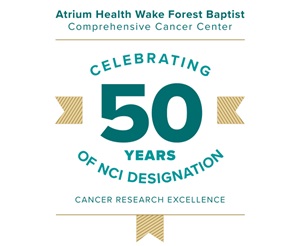
Celebrating 50 years of National Cancer Institute Designation
The Atrium Health Wake Forest Baptist Comprehensive Cancer Center is the only NCI-designated center in Western North Carolina.
Of the more than 1,000 cancer programs in the U.S., only 57 are NCI-designated comprehensive cancer centers recognized for meeting the highest standards in research and patient care.
The commitment to cancer research is why so many cancer survivors successfully fight their disease. Patients undergoing treatment hope that cancer researchers will find the keys to unlock the particular mysteries of their cancers.
Because research brings hope; basic science, clinical and public health researchers at the Atrium Health Wake Forest Baptist Comprehensive Cancer Center (AHWFBCCC) collaborate to answer complex questions that lead to promising new treatments and therapies.
Collaborative efforts include areas such as:- Translation of science from bench to bedside
- Cancer genomics and precision medicine
- Cancer imaging
- Use of natural products for treatment and symptom control
- Nanotechnology
- Tumor microenvironment
- Cancer survivorship
Cancer Accreditations
Atrium Health Wake Forest Baptist has been recognized by the Sarcoma Alliance as a designated Sarcoma Center. An acknowledgment given to leaders in sarcoma research and treatment, we are one of only two institutions in North Carolina and 52 in the country to hold this designation. The Sarcoma Alliance strives to improve the lives of people affected by sarcoma through accurate diagnosis, improved access to care, guidance, education and support.


